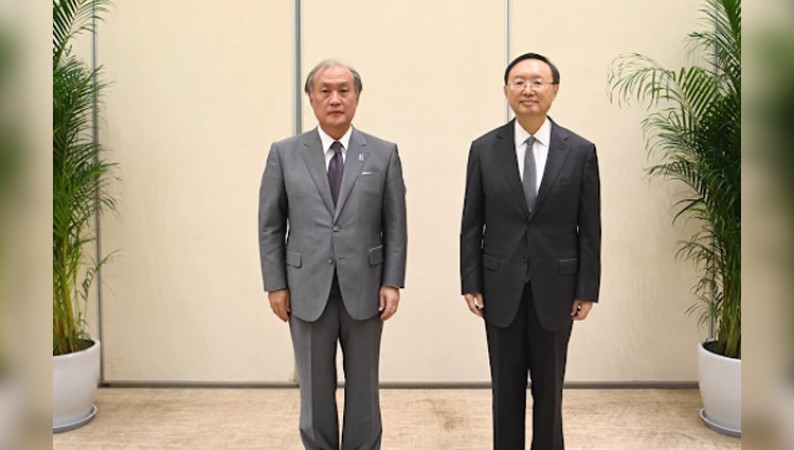
China: Despite a contentious exchange between senior officials regarding Taiwan, China and Japan have decided to hold more talks to manage their escalating tensions.
China's foreign policy chief Yang Jiechi told Japan's national security adviser, Takeo Akiba, during a seven-hour meeting in Tianjin on Wednesday that Taiwan is an integral part of China, and Akiba expressed concern over Beijing's military exercises.
The talks were described as open, exhaustive and useful by state news agency Xinhua, using a diplomatic phrase that usually refers to a controversial discussion. This is the first high-level political discussion between the two countries since 2020.
Taiwan is an integral part of Chinese territory. According to the report, Yang said that the Taiwan question "relates to the political underpinnings of Sino-Japanese relations and the fundamental trust between the two countries."
Yang argued that Japan should properly manage its differences with Beijing and focus on the fundamental long-term interests of both countries and their peoples. He also urged Tokyo to work harder to understand China.
Most nations, including Japan, do not recognize Taiwan as an independent state because Beijing views it as a separatist territory. However, Tokyo opposes any attempt to take back the island by force, as do the US and many other nations.
In retaliation for US House Speaker Nancy Pelosi's visit to the island, Beijing conducted high-profile military exercises against Taiwan, blocking the island and firing 11 DF series missiles.
Japanese news agency Kyodo reports that Akiba briefed Yang about Japan's position on tensions in the Taiwan Strait and expressed concern over five Chinese missiles that could accidentally enter Japan's exclusive economic zone.
According to Agence-France Presse, which cited an unnamed official from Japan's National Security Secretariat, which Akiba heads, he joined Prime Minister Fumio Kishida in "condemnation and protest" against Beijing's recent military demonstrations.
Before the missiles landed, China claimed there was no Exclusive Economic Zone as the two countries did not agree on its borders.
According to the official, Akiba and Yang also talked about the ongoing dispute over the Diaoyu, or Senkaku, islands in the East China Sea.
Japan has become more vocal about China's military build-up and alleged human rights abuses, while Beijing considers Tokyo more in line with the US. As a result, relations between the two countries have deteriorated.
A meeting between the foreign ministers of China and Japan that was due to coincide with a regional conference in Cambodia this month has been postponed, following criticism from Group 7 for Beijing's military drills against Taiwan.
According to the Chinese Foreign Ministry, the G7, of which Japan is a member, has no right to comment on the Taiwan issue.
However, Yang and Aqiba agreed that the two countries needed to intensify high-level talks.
In managing their bilateral relations, Yang advised the two countries to "stay focused and avoid internal and external interference".
Yang was quoted as saying, "In the face of the complex global situation, the regional and global importance of Sino-Japanese relations has become more prominent."
According to Kyodo, Akiba and Yang agreed on the value of face-to-face dialogue and multilevel communication.
In a phone call with Japanese Prime Minister Fumio Kishida, Chinese President Xi Jinping said the two countries should "properly handle major and sensitive issues", such as World War II and disagreements over Taiwan's history.
According to Kishida, the importance of maintaining stable bilateral ties to the region and the global community was balanced by his pledge that Japan "needs to say" about China's perceived shortcomings in upholding human rights and the rule of law.
According to Liu Jiangyong, a Japanese studies expert at Tsinghua University in Beijing, the high-level security talks were "on time" and "a good start".
He said defining its relationship with China would be an important test for Tokyo in Japan's upcoming national security strategy later this year.
“I believe that the talks in Tianjin are only the beginning. The Kishida administration is likely to communicate with China in the coming weeks through a variety of channels, including the media, think tanks, academics and government officials.
In light of the US-China rivalry, Liu said that Tokyo, which was initially unsure of how to approach China, had three options: to engage more closely with the US, to pursue its own regional objectives. To drive a wedge between the two, or try to serve as a mediator.
The last possibility, which Beijing may prefer, he said, is currently "very unlikely."
Japan, unlike the US, has territorial disputes with China over the Diaoyu Islands and tends to annex Taiwan with its national security. He claimed that Japan, along with the US, had effectively emerged as China's biggest Taiwan-related obstacle.
Japan makes 4 arrests on bribery suspicions in Tokyo Olympics
US, S.Korea to stage preparatory military drills before major exercise
Japan PM announces measures to combat inflation
Billionaire-backed tech fund hits headlines as US helps semiconductor industry